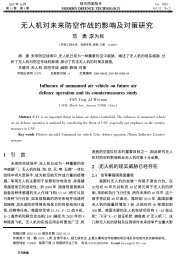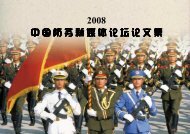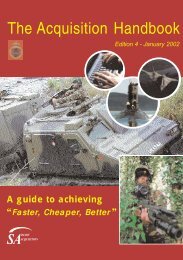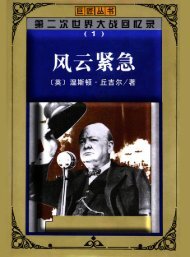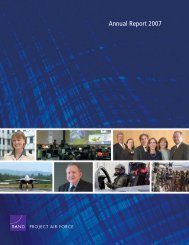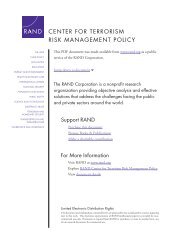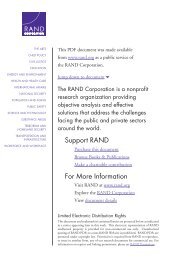How Terrorist Groups End - RAND Corporation
How Terrorist Groups End - RAND Corporation
How Terrorist Groups End - RAND Corporation
You also want an ePaper? Increase the reach of your titles
YUMPU automatically turns print PDFs into web optimized ePapers that Google loves.
130 <strong>How</strong> <strong>Terrorist</strong> <strong>Groups</strong> <strong>End</strong>: Lessons for Countering al Qa’ida<br />
ten messages to each other to maximize secrecy, used the final courier<br />
network. Normally, their most trusted couriers memorized messages<br />
and conveyed them verbatim. 18 The use of a sophisticated courier network<br />
places a premium on recruiting informants already in these organizations<br />
or placing informants in them.<br />
For the United States, this approach requires providing foreign<br />
assistance to police and intelligence services abroad to improve their<br />
counterterrorism capacity. This means relying on the efforts of law<br />
enforcement and internal security forces of states where al Qa’ida is<br />
operating. The United States can help bolster the capabilities of foreign<br />
police and intelligence services abroad, as well as share intelligence<br />
information. Key locations where al Qa’ida has a foothold include<br />
Europe (such as Britain and the Netherlands), Algeria, Turkey, Saudi<br />
Arabia, Bangladesh, Indonesia, Pakistan, Afghanistan, and Iraq. The<br />
effort against al Qa’ida will hinge on the competence of local police<br />
and intelligence services in these countries to collect information, penetrate<br />
al Qa’ida cells, arrest or kill its members, and counter its propaganda<br />
machine. Working with locals is sometimes easier said than<br />
done, since not all states may cooperate. As Harvard law professor<br />
Philip Heymann pointed out, “Some states will lack the competence to<br />
really help, and states that do not believe in the cause will make efforts<br />
too half-hearted to be effective but real enough to be indistinguishable<br />
from sanctionable incompetence.” 19 This is where other strategies, such<br />
as diplomacy and economic sanctions, can be useful in coercing states<br />
to support U.S. interests. In some cases, limited direct action may be<br />
inevitable.<br />
Capture of Key Leaders<br />
Next is the capture of key leaders and their support network. In democratic<br />
countries, this involves capturing key members and presenting<br />
the evidence in court. Terrorism involves the commission of violent<br />
crimes, such as murder and assault. The investigation, trial, and pun-<br />
18 Musharraf (2006, p. 221).<br />
19 Philip B. Heymann, “Dealing with Terrorism: An Overview,” International Security, Vol.<br />
26, No. 3, Winter 2001, pp. 24–38, p. 34.




